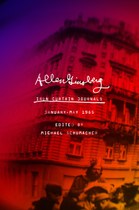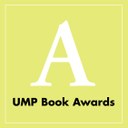Announcing a trilogy of Allen Ginsberg’s unpublished journals.
FOR IMMEDIATE RELEASE
The University of Minnesota Press will publish the first installment, IRON CURTAIN JOURNALS: JANUARY—MAY 1965, in November 2018.
Press Release Date: 2018-04-19T05:00:00+00:00
 (Minneapolis, MN) — Iron Curtain Journals by Allen Ginsberg, edited and introduced by Ginsberg biographer Michael Schumacher, is the first volume in a forthcoming trilogy of Ginsberg’s unpublished journals from the University of Minnesota Press. It will be followed by South American Journals and The Fall of America Journals.
(Minneapolis, MN) — Iron Curtain Journals by Allen Ginsberg, edited and introduced by Ginsberg biographer Michael Schumacher, is the first volume in a forthcoming trilogy of Ginsberg’s unpublished journals from the University of Minnesota Press. It will be followed by South American Journals and The Fall of America Journals.
Iron Curtain Journals documents Allen Ginsberg’s 1965 travels to Cuba, where, ignoring all advice, he behaves in his usual wonderfully provocative way and is deported to Prague. This leads to a remarkable and moving journey through the Iron Curtain countries, to Russia, to Poland and the Warsaw ghetto and to Auschwitz. When he returns to Prague, he runs afoul of the government when local students crown him “The King of May” and tour him around in a flatbed truck. He is beaten in the streets a few days later, arrested, and deported yet again: this time to swinging England, where he arrives just in time to help stage a massive international poetry reading at the Royal Albert Hall.
The second volume in this trilogy, South American Journals (Fall 2019), follows Ginsberg on a six-month trip in 1960 as he travels to Chile for a literary conference, and then to Machu Picchu and the deeper, remote regions of Peru, seeking a source for the mind-altering drug yage. The South American Journals act as an important reference to The Yage Letters, cowritten by William S. Burroughs and Ginsberg.
The third volume, The Fall of America Journals (Fall 2021), finds Ginsberg using a tape recorder given to him by Bob Dylan for spontaneous composition as he travels around the United States from 1965 to 1968. This volume will combine his journal writings with unreleased material from the transcription tapes, adding up to nothing less than the essential backstory to The Fall of America, Ginsberg’s 1974 National Book Award-winning volume of poems.
IRON CURTAIN JOURNALS will be available November 2018. For more information contact Heather Skinner at presspr@umn.edu or at 612-301-1932.
###
An excerpt from IRON CURTAIN JOURNALS:
MAR. 21, 8 A.M.
Dream—Bloody thrones?
Dragons? Forgot.
And to bring a toothbrush—my gums giving away.
Yesterday on Red Square, approaching Lenin’s tomb, the awe of the place at last, walking with Romanova toward the crowd standing around the railing before the closed door—so I asked her “Where’s Stalin now?” she said “somewhere in the wall.” “Can you visit his tomb?”—“I never visit Stalin!” she laughed. “And what did you think while he was alive?”—“Many, many of my friends disappeared—but I did not know what was happening—we just knew they were gone, and were told that they had committed crimes, but—I believed what I was explained, that perhaps they had done something but I did not know—I was shocked when I found out—“
Earlier at restaurant asked about censorship board—“The Goloyov Board”—same as Czech HSTD—Who is it? “It is not well known.”
Simonov at table with black turtleneck shirt & handsome silver gray hair, all of them discussing my Cuban experience with familiar slightly hearty cynical smiles of old schoolteachers at Central H.S. Paterson talking about the foibles of the principal—an old story, how to survive.
At tables in the room, groups of middleaged waiters—“Who’s she?”—
I pointed to a thin faced lady covering her eyes—“She’s a critic”—an older looking, short bohemian-Jewish faced chap came up, thin haired & a wen on third eye forehead, & kissed Romanova’s hand—“That’s David Samwelloff”—“You see, he is only 40 years old, but he was in the war—in the war each month counted a year—you can see in his face—That’s a difference between you Americans and our experience, you must understand—“ said Frieda.
“I hope we will be able to meet soon and I will give you advice how to be here—so that you will understand—certain things here are not the same as America—some things you are interested in are not interesting to our people.”
###



